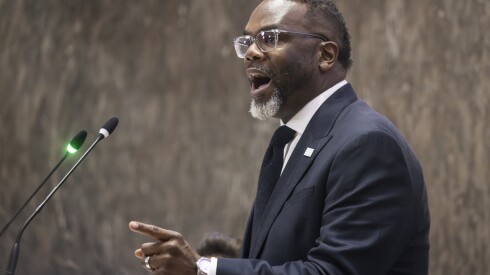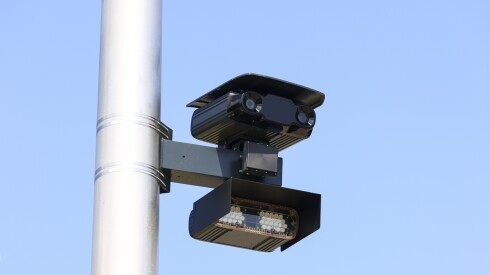Another billion dollars sure would come in handy for Mayor Brandon Johnson right about now.
He’d have that much in hand to cover a massive shortfall and mend fences in the City Council during another ugly budget season, if only the city were able to collect all the fines and fees that have been issued since he took office.
A Sun-Times analysis found the city is missing out on more than $1 billion in ambulance payments, utility bills, red-light camera tickets and other debts that have gone unpaid since December 2023.
Not that Johnson is the first mayor to find his Finance Department missing out on piles of cash. The city’s unpaid ledger stacks up to a whopping $8.2 billion dating back to the early 1990s. That would be enough to cover about half of Johnson’s budget proposal, if he could wave a magic wand to make generations of debtors pay up.
The 30-year backlog includes:
- $810.5 million in water and sewer bills and fees, including $137 million this year, a 12% increase from early in Johnson’s term;
- $1.5 billion in unpaid ambulance fees, including $148 million this year; and
- $3.1 billion in delinquent administrative hearing debt, including about $59 million this year, a 7% increase over the past two years.
Johnson has floated several fine and fee increases to help bridge a $1.16 billion deficit, but City Hall hasn’t gotten any better at collecting such payments under his watch. Officials and experts agree most of the entrenched debt will never be paid off.
Johnson’s first-year comptroller, Michael Belsky, said through a spokesperson that a new city task force “is undertaking a more targeted, data-driven approach to debt collection,” and that the Finance Department “is also exploring opportunities to monetize outstanding debt.”
The city would look to sell about $3 billion in unpaid debts amassed over the past seven years, converting the debt to an asset, says Joseph Ferguson, president of the Civic Federation, who has been in talks with city officials about the 2026 budget. The city would sell the debts to investors, who would then try to collect on those debts.
“Those interested in bidding on it would understand that the city is in need of money. It’s converting a non-performing asset into cash,” Ferguson said. “It absolutely should be done for not only balancing the 2026 budget, but it gives us time to examine the long term fixes.”
Even nibbling at the margins of the massive debt figure could ease budget pressures that are only expected to get worse in the years ahead amid federal funding uncertainty under the Trump administration.
“It’s clear based on this data that we’re not tracking debt collection and perhaps not holding people accountable enough,” said Ald. Bill Conway (34th).
Breaking down the debt
The Sun-Times reported in 2023 that City Hall’s unpaid tabs had piled up to $6.4 billion dating back to the start of former Mayor Richard M. Daley’s first term, but records released this month show that figure was actually closer to $7.2 billion.
Within two years, another $1 billion has piled up, creating the current $8.2 billion mountain of delinquent debts.
The 12% increase since late 2023 in unpaid utility bills that now surpass $810 million marks the steepest increase among the slew of debt categories tracked by the city.
Citing the “fundamental right to water access,” former Mayor Lori Lightfoot ended residential water shutoffs due to nonpayment in 2019, a move codified by the City Council in 2022. Officials still turn off water for business scofflaws and “in instances of waste, abuse of water supply, or any danger to public health.”
Unpaid fines and fees from administrative hearings still make up the biggest chunk of money owed to the city at $3.1 billion, up 7% since the Sun-Times last checked in.
The other biggest holes of debt are still hovering at about $2.3 billion in unpaid traffic and parking tickets, plus $1.5 billion in outstanding ambulance fees.
Unpaid ambulance bills have totaled $148 million so far this year alone, a category that has soared since the start of the COVID-19 pandemic as health care costs rise nationwide.
Belsky said the Finance Department’s “broader enhanced collection strategies” include coordinating with hospitals to obtain private insurance information on delinquent ambulance fees.
Drivers have skipped out on $1.6 billion in parking tickets since 1990 [including $37 million this year]; $444 million in red-light camera tickets [including $13 million this year]; and $275 million in speed camera tickets [$11 million this year]. Additionally, nearly $318,000 in unpaid traffic control violations have piled up since 2005, more than half of that racking up this year.
Additionally, the city is still tracking $452 million in cost recovery fees since 1998, plus $21.5 million in unpaid building inspection fees since 2004.
A joint effort between the departments of Finance and Law is targeting drivers and property owners who are more likely able to pay up, Belsky said, by reviewing “reviewing property values and vehicle make/model, especially within higher-income ZIP codes.”
‘You’re never going to collect it’
More than half the debts have been on the books for more than a decade, meaning they’re unlikely ever to be clawed back.
Belsky said he’s focused on the $3 billion that has gone unpaid over the past seven years, which “is more current, more traceable, and therefore more collectible.”
Many of the stale debts are owed by people who have died, businesses that have dissolved or even fraudsters who have fled the country.
“If a water bill is unpaid from 1999 and it’s collecting penalties and fines, that’s kind of a fictional number because you’re never going to collect it,” said Amanda Kass, associate director of the Government Finance Research Center at University of Illinois Chicago’s College of Urban Planning and Public Affairs.
Still, rising debt figures could potentially indicate broader economic troubles. Many of the people who owe money are on payment plans with the city.
“Oftentimes, these kinds of fees disproportionately impact non-white, lower-income households,” Kass said. “You do want to balance debt collection with helping low-income households.”
A vehicle debt relief program run by the city earlier this year waived some participants’ overdue fines and resulted in $18 million that otherwise likely wouldn’t have been collected.
“We are evaluating the expanded use of PSAs to increase awareness of all debt relief and payment plan options, which we expect will improve both compliance and collections,” Belsky said.
City officials have said the worst scofflaws are often property owners and businesses from outside Chicago that ignore collection notices.
The city can seize vehicles and withhold business licenses, and it refers cases to collection agencies to file for liens and garnish wages. It also enlists law firms to collect on old debts.
But the city won’t name the people or entities who owe the most, citing ongoing lawsuits that often drag on for years.
“It is fundamentally inequitable for individuals or businesses who benefit from city services to ignore lawful fines, especially when they have clear ability to pay,” Belsky said.
Last month, Belsky told City Council members that his agency is expanding debt checks and streamlining city payment portals.
“That same technology allows [city debt collectors] to be much more effective time-wise, because they’re not going after those seven or eight different sources. So we think that’s going to lead to an increase in collection,” Belsky said during a budget hearing last month.
That effort, combined with more parking aides patrolling the city next year, is expected to boost parking and traffic ticket revenue by some $43 million, city Budget Director Annette Guzman told council members.
Unpaid property taxes pile up
In addition to the $8.2 billion backlog, city institutions are missing out on hundreds of millions of dollars in property tax payments since 2004, according to the Cook County Treasurer’s office.
The city itself has nearly $122 million in outstanding property taxes.
The city Board of Education is owed $300.3 million and the Park District is missing out on $30.1 million, while the city’s tax increment financing districts have been shorted some $166 million. Johnson declared a record $1 billion TIF surplus to help balance his budget proposal.

